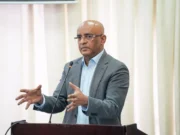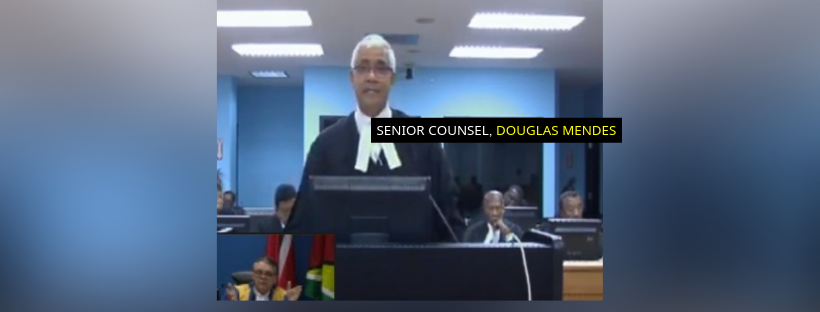As the Caribbean Court of Justice (CCJ) commenced hearing arguments into the case to determine whether President David Granger failed to properly exercise his discretion in the appointment of Justice (retired) James Patterson as Chairman of the Guyana Elections Commission (GECOM), its judge, Jacob Wit, questioned the definition of “fit and proper”.
Judge Wit asked Trinidad and Tobago based Senior Counsel, Douglas Mendes, to explain what would determine “fit and proper” when the arguments commenced this morning. The case was filed by People’s Progressive Party (PPP) Member of Parliament, Mr. Zulfikar Mustapha who alleges that President David Granger failed to properly exercise his discretion in the GECOM Chairman’s appointment.
Mustapha’s argument is that the appointment was in breach of Article 161 (2) of the Constitution of Guyana. Senior Counsel Douglas Mendes in his opening arguments insisted that President Granger ought to have provided reasons for his rejection of three lists submitted to him by the Leader of the Opposition, Bharrat Jagdeo, each consisting of six names of nominees for the post. Senior Counsel Mendes is representing Mustapha in association with attorney-at-law Anil Nandlall and others.
Laying the basis for this argument, Senior Counsel Mendes relied on Article 161 (2) which states, “…the Chairman of the Elections Commission shall be a person who holds or who has held office as a judge of a court having unlimited jurisdiction in civil and criminal matters in some part of the Commonwealth or a court having jurisdiction in appeals from any such court or who is qualified to be appointed as any such judge, or any other fit and proper person, to be appointed by the President from a list of six persons, not unacceptable to the President, submitted by the Leader of the Opposition after meaningful consultation with the non-governmental political parties represented in the National Assembly.”
“Provided that if the Leader of the Opposition fails to submit a list as provided for, the President shall appoint a person who holds or had held office as a judge of a court having unlimited jurisdiction in civil and criminal matters in some part of the Commonwealth or a court having jurisdiction in appeals from any such court or who is qualified to be appointed as any such judge.”
Justice Wit said that the judicial category was “quite clear”, but asked Senior Counsel Mendes about the other category, which is a person who is “fit and proper.” Asked by the Judge to explain what would determine “fit and proper”, Mendez said, “It is suggesting that the fit and proper person would have the qualities of a judge or somebody who is qualified to be a judge. So I imagine that we would be looking for somebody who has an independence of mind, somebody who is impartial… somebody who is capable of analysis of the relevant provisions of the law that they would have to apply.”
Senior Counsel Mendes continued, “But obviously not necessarily a lawyer but somebody of stature, somebody of integrity and so on. Those are the persons that would ordinarily fit within that category of other fit and proper person.”
At this point, CCJ President Adrian Saunders reminded Mendes that the Constitution did not outline a specific requirement for any particular competence as it relates to electoral matters.
Senior Counsel Mendez reasoned, “There is no indication that you need to know about electoral system or have previous experience in running a similar department.” Justice Saunders pointed out, “Because a judge may not have that.”
“A judge may go through his/her entire career without doing an elections matter. That has happened frequently,” Douglas responded.
Furthermore, CCJ Judge Winston Anderson questioned Senior Counsel Mendes on whether he knew why the “fit and proper” category was introduced because it was not included in the previous article. The Senior Counsel stated that while historical records in that regard are not clear, he said he believes that during the tenure of a former Chief Justice as chairman of the electoral body moves were made to amend that clause.
Senior Counsel Mendes reasoned, “I imagine it is because of the realisation…that judges may not necessarily be persons the entire population has confidence in. So they expanded it to include persons who are otherwise.”
One of the judges responded, “I’m sorry” to his reasoning. There was some laughter among the judges, after which Senior Counsel noted that SC Mendes said, “May not necessarily.”
The hearing of arguments is still continuing and the State is currently presenting its arguments. The matter is expected to conclude at 14:00hrs.













